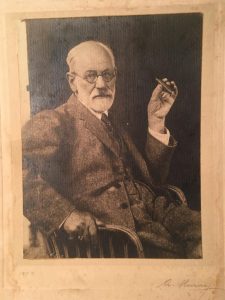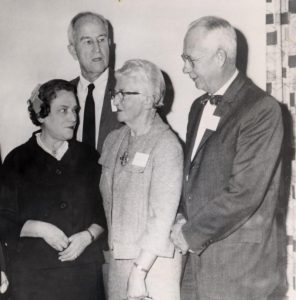Olga Umansky, MLIS, is a librarian and archivist of the Hanns Sachs Library at BPSI. Her remarks below originally appeared in the Summer 2018 issue of the library newsletter, which can be read here.

signed by “Dr. Murray” in 1933
BPSI Archives
The handwriting analysis of both John Murray and Henry Murray revealed that the portrait of Freud donated to the BPSI Archives by John Baker, PhD, is likely to have belonged to Henry Murray. The same portrait appears on the front page of the Freud Standard Edition Vol. 22. In response to the story in the Spring 2018 library newsletter, James W. Anderson, PhD, contacted our archives offering to compare Henry Murray’s signatures in his letters from Henry Murray to the one on the donated photograph. Dr. Anderson is a faculty member at the Chicago Institute for Psychoanalysis and an Associate Professor of Clinical Psychology at Northwestern University Medical School. He is the author of the recently published Interview with Henry A. Murray on his meeting with Sigmund Freud (Anderson, 2017) and two earlier essays about Murray’s life.
Henry Alexander Murray (1893 -1988) was a famous psychologist, Director of Harvard Psychological Clinic, founder of the theory of personality, and codeveloper, with Christiana Morgan, of the Thematic Apperception Test (TAT). According to Ives Hendrick’s book The Birth of an Institute, he was a member of the original Boston Psychoanalytic Society in 1930 and Chair of the Education Committee in 1933-1934. “Murray completed full psychoanalytic training that included a training analysis with Franz Alexander and supervision with Hanns Sachs.” (Anderson, 1988). In 1925 he traveled to Switzerland to meet with, and be analyzed by, Carl Jung. He also once met with Freud in early 1938 in Vienna. Appreciative of both Freudian and Jungian theories, Murray was often critical of Freud’s dogmatic interpretation of the Oedipal complex. Although he is listed as BPSI’s Guest of Honor in 1958, our historical files suggest that he left the membership by 1935.

BPSI Archives
A founder of personality assessments and studies of stress and distress, he seemed disappointed by Freud’s dismissal of experiments (Anderson, 2017). On the other hand, there are many references to Murray’s appreciation of psychoanalysis. “I accept a large part (more than half) of the psychoanalytic scheme,” he wrote in his 1940 paper entitled What Should Psychologists Do about Psychoanalysis? (Murray, 1940). He spread psychoanalytic ideas in his teachings at a time when very few knew about psychoanalysis. BPSI’s late Director of Archives, Sanford Gifford recalled that he himself, an art history student at the time, had become interested in psychoanalysis because one of his Harvard classmates had participated in Henry Murray’s study (Wolff, Umansky, 2017). Henry Murray’s remarks about Freud as “a warm and cordial person” (Anderson, 2017), makes the presence of Freud’s portrait in his study all the more believable.

References:
- Anderson, J.W. (2017). An interview with Henry A. Murray on his meeting with Sigmund Freud. Psychoanalytic Psychology, 34(3):322-331.
- Anderson, J.W. (1988). Henry A. Murray’s early career: A psychobiographical exploration. Journal of Personality, 56:139-171.
- Hendrick, I. (1961). The Birth of an Institute Twenty-Fifth Anniversary the Boston Psychoanalytic Institute. November 30, 1958. Freeport, Me., Bond Wheelwright Co.
- Murray, H. A. (1940). What should psychologists do about psychoanalysis? The Journal of Abnormal and Social Psychology, 35(2), 150-175.
- Wolff, A., Umansky, O. (2017). Sanford Gifford, 1918- 2013. American Imago, 74(4):431-439.
Olga Umansky can be contacted by email here.
***
The opinions or views expressed on the Boston Psychoanalytic Society & Institute (“BPSI”) social media platforms, including, but not limited to, blogs, Facebook posts and Twitter posts, represent the thoughts of individual contributors and are not necessarily those of the Boston Psychoanalytic Society & Institute or any of its directors, officers, employees, staff, board of directors, or members. All posts on BPSI social media platforms are for informational purposes only and should not be regarded as professional advice.
BPSI does not control or guarantee the accuracy, relevance, timeliness or completeness of information contained in its contributors’ posts and/or blog entries, or found by following any linked websites. BPSI will not be liable for any damages from the display or use of information posted on its website or social media platforms. BPSI cannot and does not authorize the use of copyrighted materials contained in linked websites.

